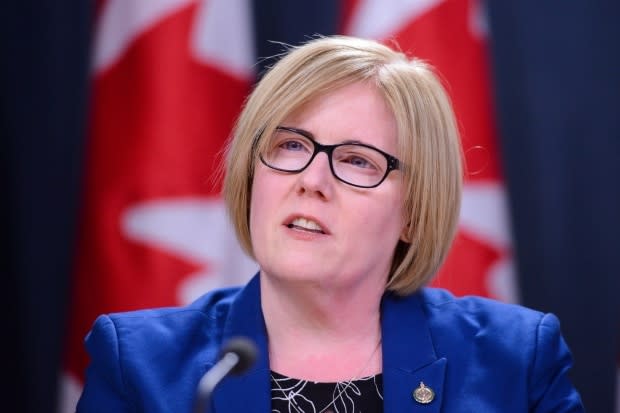Federal COVID-19 supports for Canadians with disabilities are too little, too late, advocates say
More than six months into the global pandemic, the Liberal government is being accused of failing to meet the needs of the Canadians with disabilities who are among those hardest-hit by the public health crisis.
Marie-Claude Landry, chief commissioner of the Canada Human Rights Commission, said COVID-19 has "expanded the circle of vulnerability" in Canada — but people with disabilities still aren't getting the support they need.
"We urge the government to immediately address the unmet financial needs of people with disabilities in an equitable way," she said in a media statement.
The federal government has promised a one-time $600 emergency benefit for Canadians with disabilities but that money has not yet been spent.
Landry said people with disabilities faced barriers before COVID-19 and the pandemic has only made their plight worse.
People with disabilities face more challenges in a pandemic climate, she said. Those who are blind or visually impaired have to rely on touching non-sanitized surfaces and can't see if people around them are practising safety protocols. People who are deaf or hard of hearing who normally rely on reading lips to communicate now face a world of masked faces. And there are longer waits now for health care and other services, while the prolonged isolation caused by pandemic containment measures can have a negative impact on mental health.
A 'call to justice'
"We are asking that, as Canada in this moment of national crisis, the health, financial welfare and the human rights of people with disabilities be front and centre," Landry said.
NDP critic for employment, workforce development and disability inclusion Daniel Blaikie called Landry's assessment "an important call to justice for people living with disabilities in Canada."
"The amount of pressure the NDP had to put on the Liberal government for them to offer a simple income support payment is a strong sign that they do not understand the urgency of the problem," he said.
"The amount of time it has taken them to deliver that payment, which still has not been made, is a strong sign they lack the political will to make this a priority."
Employment, Workforce Development and Disability Inclusion Minister Carla Qualtrough said the government has been committed to considering and addressing the needs of people with disabilities since the beginning of the health crisis.
In a media statement, Qualtrough pointed to the federal government's launch in April of a COVID-19 disability advisory group tasked with flagging emerging challenges and providing guidance.

"We recognize that this pandemic has highlighted long-standing systemic barriers to disability inclusion. Moving forward, we are committed to a disability-inclusive pandemic recovery response," she said.
"We know that we need to do more to support and include Canadians with disabilities. We all benefit when everyone can participate equally in our economy and society."
$600 benefit coming this fall: Qualtrough
Qualtrough listed the various benefits the government has provided to help address the workplace, food security, technological and educational needs of Canadians with disabilities and said the one-time $600 payments will arrive this fall.
There is no specific timeframe for that benefit yet but the government says it will be issued automatically to people who hold disability tax credit certificates and beneficiaries of government disability pensions. People who are eligible but have never applied for the certificate, or have one that's expired, must apply by Sept. 25.
Jewelles Smith, past chairperson of the Council for Canadians with Disabilities, said many people won't qualify for the benefit — and for those who do, it will be only a "drop in the bucket."
"This $600 will not benefit most Canadians with disabilities. It is not enough to offset the extra costs," she said. "And a one-time payment over six months into the pandemic is not going to alleviate the desperate situation many people with disabilities find themselves in."
On the upside, Smith said some people with disabilities who are now working from home have experienced fewer barriers and improved health because of more flexible work conditions.
On the downside, many are also experiencing new barriers, with reconfigured shops, businesses and workplaces struggling to comply with physical distancing rules.
Added costs, reduced incomes
Many also are struggling with increased costs of living due to extra cleaning expenses, delivery services and the need for protective equipment, all while seeing a reduction in income, Smith said.
Conservative employment, workforce development and disability inclusion critic MP Peter Kent said more must be done to ease the disruption and barriers for people with disabilities during the pandemic.
"It is important that, when safety protocols for COVID are implemented, that careful consideration is given to how those protocols affect disabled Canadians, and [to] ... workaround remedies. All levels of government need to work together to support disabled Canadians during this challenging time," he said.
As for the one-time $600 emergency benefit, Kent said that should have landed long ago.
"This Liberal government has been quick to announce benefits but slow to get support to Canadians," he said.
"Canadians with disabilities need help yesterday. The Trudeau Liberals need to get this support to Canadians with disabilities now."

